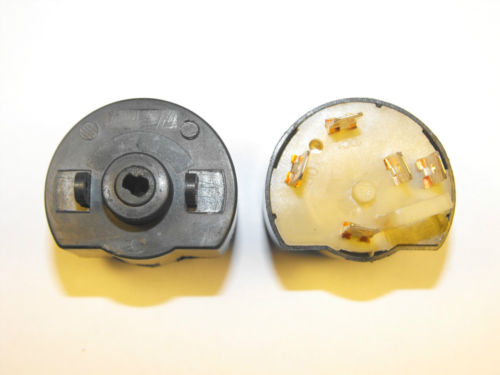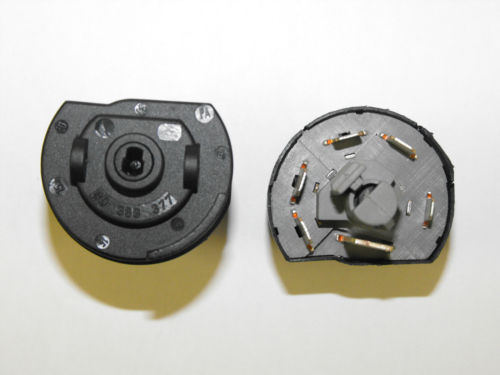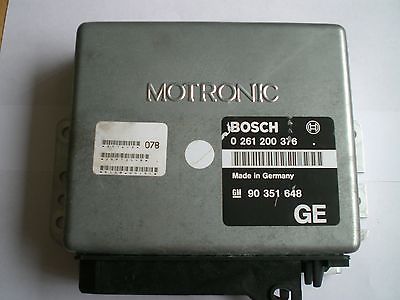1989 Opel Vectra GT
Re: 1989 Opel Vectra GT
When refurbishing my 1980s van, I checked and cleaned every connector.
I replaced over 50 female spade connectors because of 40 years of oxidation and decay.
I replaced over 50 female spade connectors because of 40 years of oxidation and decay.
- vectra1903
- Registered user
- Posts: 167
- Joined: Fri Sep 27, 2019 8:44 pm
- Location: Poland
Re: 1989 Opel Vectra GT
Is there any way to be able to turn on the radio without the "full" ignition power enabled?
My mother's honda has a position on the key switch that only enables the radio. The Vectra also has something like this but nothing happens when the key is in this position
My mother's honda has a position on the key switch that only enables the radio. The Vectra also has something like this but nothing happens when the key is in this position
Re: 1989 Opel Vectra GT
You should be able to turn on an original radio for one hour with the ignition off.
There is no "accessory live" or position 1 on the ignition switch.
On the cars up to 1994, it is not possible to add an accessory live position.
On the very late cars ( 1995 ) models, the same ignition switch as the Vectra-B is used, and therefore accessory live can be added.
There is a How 2 somewhere by Gaz...
I will see if I can find it for you.
There is no "accessory live" or position 1 on the ignition switch.
On the cars up to 1994, it is not possible to add an accessory live position.
On the very late cars ( 1995 ) models, the same ignition switch as the Vectra-B is used, and therefore accessory live can be added.
There is a How 2 somewhere by Gaz...
I will see if I can find it for you.
- thomas
- Registered user
- Posts: 237
- Joined: Sat Dec 31, 2011 11:18 pm
- Location: Roxburghshire, Scotland
Re: 1989 Opel Vectra GT
Seem to remember the original Grundig radios on the earlier cars, had something called logic-on and-logic off, which controlled whether it would operate without the ignition on, or even having the key in. Prefer myself to have it always operable. Don't know what radio would have originally been in my current LSi, it has an aftermarket Sony unit, without this option.
My pre-facelift 1.6L, Aug 92, K-plate, had them, on both sides
Robsey wrote: ↑Sun Apr 10, 2022 6:38 pm
I wasn't aware that the pre-facelift headlamps had electronic adjusters. (1988 to 1991).
My 1994 LSi had them from the factory.
Took them out when I fitted Depo Halo's.
Looking back, I think I prefer the original factory look.
Maybe one day I will refit the original light units.
My pre-facelift 1.6L, Aug 92, K-plate, had them, on both sides
--
Cav 1994 1.8LSi 5-dr Jungle Green Pearl: Daily.
Cav 1994 1.8LSi 5-dr Jungle Green Pearl: Daily.
Re: 1989 Opel Vectra GT
Found it - it was Squig's WIP many years ago.
Here is a copy of his post.
Then Gaz produced an spare ignition switch from a vectra and mentioned a little trick... the vectra has an extra wire in the ignition switch that allows 12v power at ignition position 1 prior to cranking and 12v at positions 1 and 0 providing the key remains in the ignition.
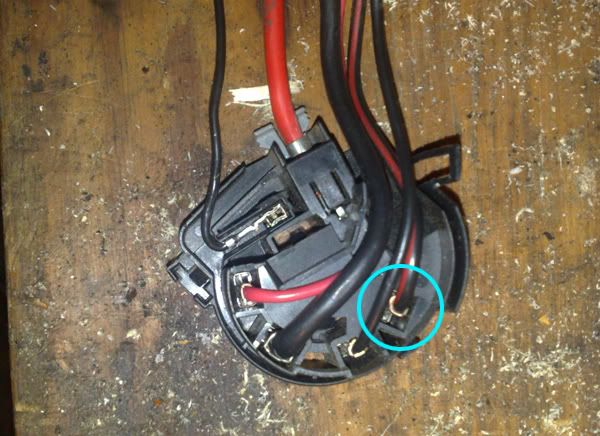
The Vectra ignition wiring with the additional wire circled in blue...THIS IS INCORRECT THE ADDITIONAL WIRE THAT IS NEEDED IS THE RED ONE ON THE FAR LEFT OF THE SWITCH, I JUST USED THE CIRCLED WIRE FROM THE VECTRA SWITCH.
So he removed a wire from the vectra switch to cannibalise the pin and wiring...
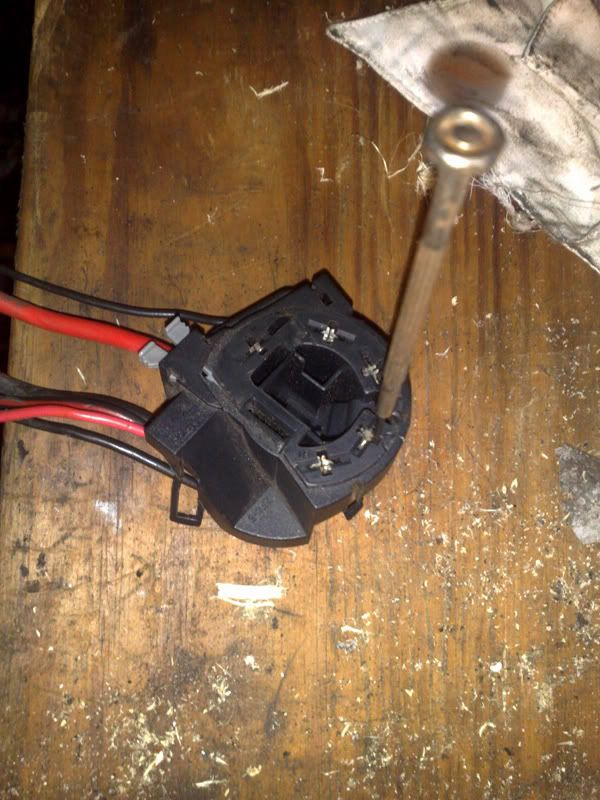
incidentally the required pin type is the one on the right of the pictures below...
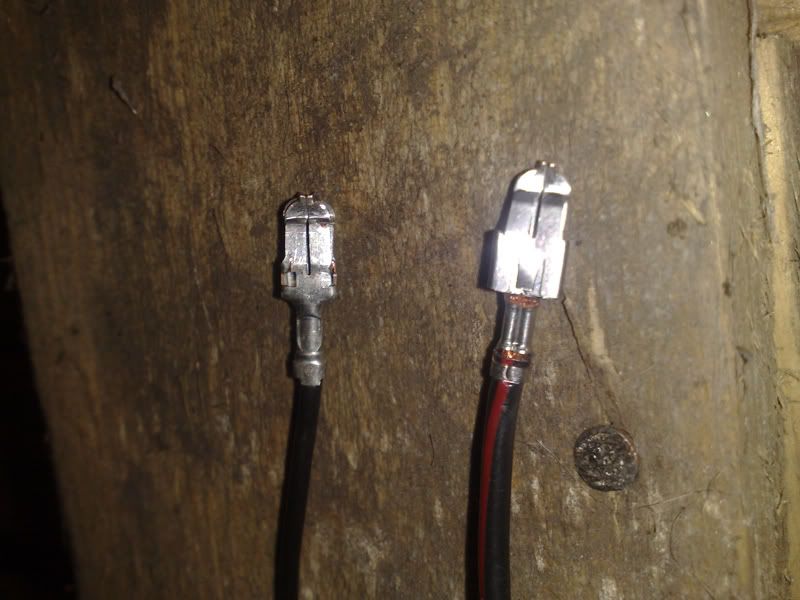
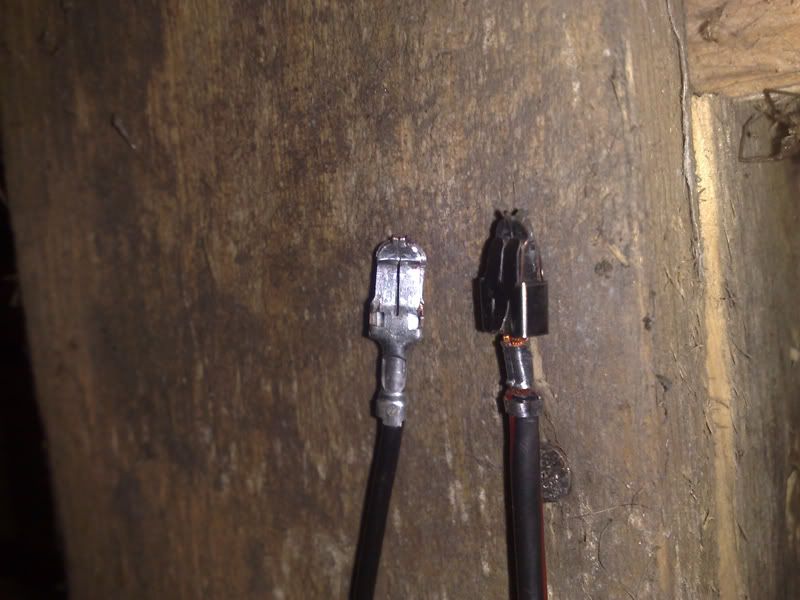
Then hook this wire into the same position as the thinner red wire in the first ignition switch picture on the existing ignition switch on the cav and wire into the switched live on the stereo.
Perfect.
Here is a copy of his post.
Then Gaz produced an spare ignition switch from a vectra and mentioned a little trick... the vectra has an extra wire in the ignition switch that allows 12v power at ignition position 1 prior to cranking and 12v at positions 1 and 0 providing the key remains in the ignition.

The Vectra ignition wiring with the additional wire circled in blue...THIS IS INCORRECT THE ADDITIONAL WIRE THAT IS NEEDED IS THE RED ONE ON THE FAR LEFT OF THE SWITCH, I JUST USED THE CIRCLED WIRE FROM THE VECTRA SWITCH.
So he removed a wire from the vectra switch to cannibalise the pin and wiring...

incidentally the required pin type is the one on the right of the pictures below...


Then hook this wire into the same position as the thinner red wire in the first ignition switch picture on the existing ignition switch on the cav and wire into the switched live on the stereo.
Perfect.
- ilovedmymantas
- Registered user
- Posts: 1240
- Joined: Sat Jan 12, 2013 2:54 am
Re: 1989 Opel Vectra GT
I'm not sure I see any advantage doing this now. 
Years ago It made sense, playing the radio without the keys in and keeping kids occupied with music while you nipped somewhere, whilst denying them the opportunity of doing something dangerous.
Nowadays everyone has a mobile phone and entertains themselves?
Years ago It made sense, playing the radio without the keys in and keeping kids occupied with music while you nipped somewhere, whilst denying them the opportunity of doing something dangerous.
Nowadays everyone has a mobile phone and entertains themselves?
" It's not rust. It's age-related patina " 
1980 vauxhall cavalier MK1 1.6L, 1982 opel manta berlinetta 1.8s, 1985 opel manta 2.0 gte, 1990 cavalier 2.0 gl ,1994 cavalier sri x20xev
-1995 cdx x20xev
---------------
Matt
1980 vauxhall cavalier MK1 1.6L, 1982 opel manta berlinetta 1.8s, 1985 opel manta 2.0 gte, 1990 cavalier 2.0 gl ,1994 cavalier sri x20xev
-1995 cdx x20xev
---------------
Matt
Re: 1989 Opel Vectra GT
I sort-of have to agree.
When producing new looms for the camper van, I was able to add parking-light position, and key-in (accessory) position.
But once I had done this, I could not think what I would need them for.
Obviously parking lights when parked at night on a road with a speed limit over 30mph (50kph).
But there are not many roads like that in my area any more.
More chance of using it as a dummy alarm led power feed.
And key-in. I did think radio at first, along with bluetooth, although most bluetooth kits do not cut power to the bluetooth module when you are in mid-call and turn off the ignition.
They normally stay active until you end the call.
My only thought was for an alarm control power wire.
(80s style noisy Cobra VAG alarm).
The thought being that the key needs to be inserted to kill the alarm, not just shorting the necessary wires in the ignition switch, although I am sure theft by hot-wiring is a thing of the past.
Immobilisor will be separate of course.
Our Vectra-C uses the key-in function for the radio ignition logic.
Turns the radio on with the ignition, but does not turn off the radio until you remove the key.
When producing new looms for the camper van, I was able to add parking-light position, and key-in (accessory) position.
But once I had done this, I could not think what I would need them for.
Obviously parking lights when parked at night on a road with a speed limit over 30mph (50kph).
But there are not many roads like that in my area any more.
More chance of using it as a dummy alarm led power feed.
And key-in. I did think radio at first, along with bluetooth, although most bluetooth kits do not cut power to the bluetooth module when you are in mid-call and turn off the ignition.
They normally stay active until you end the call.
My only thought was for an alarm control power wire.
(80s style noisy Cobra VAG alarm).
The thought being that the key needs to be inserted to kill the alarm, not just shorting the necessary wires in the ignition switch, although I am sure theft by hot-wiring is a thing of the past.
Immobilisor will be separate of course.
Our Vectra-C uses the key-in function for the radio ignition logic.
Turns the radio on with the ignition, but does not turn off the radio until you remove the key.
- vectra1903
- Registered user
- Posts: 167
- Joined: Fri Sep 27, 2019 8:44 pm
- Location: Poland
Re: 1989 Opel Vectra GT
Yes, the original radio was capable of that but I have switched to a Blaupunkt Coburg CM62 unit which doesn't have that.Robsey wrote: ↑Thu Jun 09, 2022 10:31 pm You should be able to turn on an original radio for one hour with the ignition off.
There is no "accessory live" or position 1 on the ignition switch.
On the cars up to 1994, it is not possible to add an accessory live position.
On the very late cars ( 1995 ) models, the same ignition switch as the Vectra-B is used, and therefore accessory live can be added.
There is a How 2 somewhere by Gaz...
I will see if I can find it for you.
I am trying to gather some information about my idle rpm problem.
So my situation is this: my idle is a bit low (600-700 rpm, closer to 600 though) and the engine shudders every couple of seconds.
I have replaced the whole ignition system which means plugs, wires, cap, rotor arm. I checked the coil resistance and it's fine. The rubber pipes are all in decent shape, no cracks to be seen at first glance. The gasket between the throttle body and manifold is good. The car drives fine, doesn't cough or shudder, the issue is only at idle. The car also has problems with starting after stalling (most likely while pressing the brake pedal). It takes a long time to start and is very unstable at first but gets up to speed in a moment. I've had 3 used ICV's. One was broken and 2 were tested and presumably working fine. The ECU temp sensor is new, as is the TPS. When unplugging the ICV the car jumped to approx. 1200rpm. There are no EML codes or lights. The o2 sensor is original and untested, the car does around 28MPG in a mixed use, that means city and short trips. It's got good throttle response, no hesitation, accelerates fine and performs good under load, so the problem is strictly idle related. I do get an occasional shudder when giving it gas while idling, so at anywhere from 2-4 thousand rpm. The engine is in perfect condition, oil and timing done regularly so it's not a thrashed worn engine with problems, doesn't burn any oil.
What may be my problem? Precisely I'd like a write-up of all of the parts which may have gone bad or worn out causing this problem. I suspect only the o2 sensor and ICV, maybe also injectors. The airflow meter is probably working as unplugging it stalls the engine and throws a check engine light.
Re: 1989 Opel Vectra GT
After restoring my car, my C20NE had a lot of the same issues.
Whenever you unplug the air flow meter (AFM) it should stall.
The car will start again, but it will run quite lumpy.
It should light the EML / MIL on the dash.
When you unplug the idle control valve (ICV), the revs should increase a lot, and it should light the EML / MIL on the dash.
Plugging it back in should cause the car to stall.
From what you have said, you have covered everything that I would have checked.
I had got used to the slow idle, however a good idle control valve made a huge difference.
If everything checks out, then I believe that Vauxhall in the UK used Tech-1 to reprogram the idle speed settings due to the slow erratic rpm.
I am not sure if there is anyone in Poland with a Vetronix Mastertech Tech-1a programmer.
Probably looking at enthusiasts as dealers got rid years ago.
Or perhaps Tech-2 with an adapter.
Whenever you unplug the air flow meter (AFM) it should stall.
The car will start again, but it will run quite lumpy.
It should light the EML / MIL on the dash.
When you unplug the idle control valve (ICV), the revs should increase a lot, and it should light the EML / MIL on the dash.
Plugging it back in should cause the car to stall.
From what you have said, you have covered everything that I would have checked.
I had got used to the slow idle, however a good idle control valve made a huge difference.
If everything checks out, then I believe that Vauxhall in the UK used Tech-1 to reprogram the idle speed settings due to the slow erratic rpm.
I am not sure if there is anyone in Poland with a Vetronix Mastertech Tech-1a programmer.
Probably looking at enthusiasts as dealers got rid years ago.
Or perhaps Tech-2 with an adapter.
- vectra1903
- Registered user
- Posts: 167
- Joined: Fri Sep 27, 2019 8:44 pm
- Location: Poland
Re: 1989 Opel Vectra GT
I swear that I posted the results of unplugging the ICV in this thread but for the life of me I can't find that post. From what I remember it didn't stall the engine when I plugged back in, it just got back to the usual idle. I don't think it even put on any engine light. As for the airflow meter the engine light turned off quickly and I didn't notice any difference in running. I have to consider that this is a very dated version of the motronic system so probably older than most Vauxhalls thoroughly documented on the web and it may act a bit differently.Robsey wrote: ↑Fri Jun 10, 2022 7:39 pm After restoring my car, my C20NE had a lot of the same issues.
Whenever you unplug the air flow meter (AFM) it should stall.
The car will start again, but it will run quite lumpy.
It should light the EML / MIL on the dash.
When you unplug the idle control valve (ICV), the revs should increase a lot, and it should light the EML / MIL on the dash.
Plugging it back in should cause the car to stall.
From what you have said, you have covered everything that I would have checked.
I had got used to the slow idle, however a good idle control valve made a huge difference.
If everything checks out, then I believe that Vauxhall in the UK used Tech-1 to reprogram the idle speed settings due to the slow erratic rpm.
I am not sure if there is anyone in Poland with a Vetronix Mastertech Tech-1a programmer.
Probably looking at enthusiasts as dealers got rid years ago.
Or perhaps Tech-2 with an adapter.
Re: 1989 Opel Vectra GT
There are only three versions of the Motronic ECU used on the 2 litre 8 valve engines.
The early 20SEH used version 4.1
The 20NE / C20NE used version 1.5.
This is the most common version in the UK.
There is a lesser known version 1.5.2
Mine is the common version 1.5 ECU with alpha-code GE.
If the ECU did not recognise a fault when the ICV was unplugged, then perhaps the problem is with the ECU.
I know mine always put a fault light on when I unplugged the ICV.
Yes you did post up how your ICV behaved - that is why I posted up what 'should' happen.
The early 20SEH used version 4.1
The 20NE / C20NE used version 1.5.
This is the most common version in the UK.
There is a lesser known version 1.5.2
Mine is the common version 1.5 ECU with alpha-code GE.
If the ECU did not recognise a fault when the ICV was unplugged, then perhaps the problem is with the ECU.
I know mine always put a fault light on when I unplugged the ICV.
Yes you did post up how your ICV behaved - that is why I posted up what 'should' happen.
- vectra1903
- Registered user
- Posts: 167
- Joined: Fri Sep 27, 2019 8:44 pm
- Location: Poland
Re: 1989 Opel Vectra GT
Unfortunately the only ECU I can find is a Kadett unit with a different alpha code so that's not great.Robsey wrote: ↑Sat Jun 11, 2022 12:34 am There are only three versions of the Motronic ECU used on the 2 litre 8 valve engines.
The early 20SEH used version 4.1
The 20NE / C20NE used version 1.5.
This is the most common version in the UK.
There is a lesser known version 1.5.2
Mine is the common version 1.5 ECU with alpha-code GE.
If the ECU did not recognise a fault when the ICV was unplugged, then perhaps the problem is with the ECU.
I know mine always put a fault light on when I unplugged the ICV.
Yes you did post up how your ICV behaved - that is why I posted up what 'should' happen.
- vectra1903
- Registered user
- Posts: 167
- Joined: Fri Sep 27, 2019 8:44 pm
- Location: Poland
Re: 1989 Opel Vectra GT
Mine is the earliest one, the newer ones are a bit taller, mine has a metal clip for the plug and well, pretty much looks like this one here:

2 rows of pins on the plug socket.
Re: 1989 Opel Vectra GT
Yours is just mine rotated 180°.
The pins, connector layout and plug moulding are the same.
Checking alpha code FH gives Astra mk2, but it is for the 20SEH and 20SER engine.
Part number is also 90 295 519.
FH was never used on the Cavalier / Vectra-A.
Alpha codes for the Vectra-A are.
(20NE / C20NE)
FT - 90 348 260
GE - 90 369 473
(For 20SEH).
FU - 90 348 261
GF - 90 369 474
The SEH / SER engine will run richer than the 20NE / C20NE engines.
Update:- I should say that the two-letter Alpha-Code is more important than the part number.
Vauxhall / Opel changed part numbers through the years, but the alpha-code should always be the same.
So for a Vectra-A, either FT or GE would be the best for your car.
There are other codes for random countries like Venuzuela and Japan. I could not see any specific European country codes.
Being for Kadet-E (Astra-mk2 / Belmont), the SEH / SER ECUs could be either Motronic ML4.1 or the later Motronic 1.5.
In your case, I suspect ML4.1.
The pins, connector layout and plug moulding are the same.
Checking alpha code FH gives Astra mk2, but it is for the 20SEH and 20SER engine.
Part number is also 90 295 519.
FH was never used on the Cavalier / Vectra-A.
Alpha codes for the Vectra-A are.
(20NE / C20NE)
FT - 90 348 260
GE - 90 369 473
(For 20SEH).
FU - 90 348 261
GF - 90 369 474
The SEH / SER engine will run richer than the 20NE / C20NE engines.
Update:- I should say that the two-letter Alpha-Code is more important than the part number.
Vauxhall / Opel changed part numbers through the years, but the alpha-code should always be the same.
So for a Vectra-A, either FT or GE would be the best for your car.
There are other codes for random countries like Venuzuela and Japan. I could not see any specific European country codes.
Being for Kadet-E (Astra-mk2 / Belmont), the SEH / SER ECUs could be either Motronic ML4.1 or the later Motronic 1.5.
In your case, I suspect ML4.1.
- vectra1903
- Registered user
- Posts: 167
- Joined: Fri Sep 27, 2019 8:44 pm
- Location: Poland
Re: 1989 Opel Vectra GT
The plug is different, the later ones had 3 rows of pins, while the early ones had 2.Robsey wrote: ↑Mon Jun 13, 2022 8:50 pm Yours is just mine rotated 180°.
The pins, connector layout and plug moulding are the same.
Checking alpha code FH gives Astra mk2, but it is for the 20SEH and 20SER engine.
Part number is also 90 295 519.
FH was never used on the Cavalier / Vectra-A.
Alpha codes for the Vectra-A are.
(20NE / C20NE)
FT - 90 348 260
GE - 90 369 473
(For 20SEH).
FU - 90 348 261
GF - 90 369 474
The SEH / SER engine will run richer than the 20NE / C20NE engines.
Update:- I should say that the two-letter Alpha-Code is more important than the part number.
Vauxhall / Opel changed part numbers through the years, but the alpha-code should always be the same.
So for a Vectra-A, either FT or GE would be the best for your car.
There are other codes for random countries like Venuzuela and Japan. I could not see any specific European country codes.
Being for Kadet-E (Astra-mk2 / Belmont), the SEH / SER ECUs could be either Motronic ML4.1 or the later Motronic 1.5.
In your case, I suspect ML4.1.
I swapped ECUs, put in one with an identical alpha code and part number and nothing has changed. It idles as it did before and unplugging the ICV doesn't throw any engine light.
- vectra1903
- Registered user
- Posts: 167
- Joined: Fri Sep 27, 2019 8:44 pm
- Location: Poland
Re: 1989 Opel Vectra GT
I unplugged my o2 sensor and there is absolutely no difference in how the car runs. Does that mean that my sensor is bad? There is also no check engine light.
Re: 1989 Opel Vectra GT
If it is an early ecu, it will not be expecting an oxygen sensor.
The SEH and SER engines were never fitted with catalytic converters and so, no need for a lambda sensor.
So to clarify, If the ECU is not expecting the 02 sensor, it will not put a light on if the sensor is disconnected.
The SEH and SER engines were never fitted with catalytic converters and so, no need for a lambda sensor.
So to clarify, If the ECU is not expecting the 02 sensor, it will not put a light on if the sensor is disconnected.
- vectra1903
- Registered user
- Posts: 167
- Joined: Fri Sep 27, 2019 8:44 pm
- Location: Poland
Re: 1989 Opel Vectra GT
This is a C20NE so it does have a lambda sensor so I think it should make a difference if I unplug it. But there is absolutely no difference at all.Robsey wrote: ↑Thu Jun 16, 2022 7:17 pm If it is an early ecu, it will not be expecting an oxygen sensor.
The SEH and SER engines were never fitted with catalytic converters and so, no need for a lambda sensor.
So to clarify, If the ECU is not expecting the 02 sensor, it will not put a light on if the sensor is disconnected.
Re: 1989 Opel Vectra GT
Okay -
Just looking in more depth.
You will definitely have a Motronic ML4.1 control unit.
Hidden in the writing it mentions a 35 pin connector.
(1989 and 1990 vehicles).
There is a comment in the info system as follows:-
Subject - Increased Idle Speed.
Vehicles - Vectra / Cavalier 4x4 with C20NE and 20SEH engines.
On Vectra / Cavalier 4x4, increased idle speed is necessary for satisfactory idling.
On vehicles with Motronic ML4.1, this is attained by connecting the transmission fluid switch input on the wiring harness (Terminal 11 of 35-pin control unit plug) with ground.
-
I know yours is not a 4x4, but you could see if shorting ECU pin 11 to ground helps with your idle speed.
ECU codes quoted are -
C20NE -
FF - 90 280 357
FT - 90 324 330
Just looking in more depth.
You will definitely have a Motronic ML4.1 control unit.
Hidden in the writing it mentions a 35 pin connector.
(1989 and 1990 vehicles).
There is a comment in the info system as follows:-
Subject - Increased Idle Speed.
Vehicles - Vectra / Cavalier 4x4 with C20NE and 20SEH engines.
On Vectra / Cavalier 4x4, increased idle speed is necessary for satisfactory idling.
On vehicles with Motronic ML4.1, this is attained by connecting the transmission fluid switch input on the wiring harness (Terminal 11 of 35-pin control unit plug) with ground.
-
I know yours is not a 4x4, but you could see if shorting ECU pin 11 to ground helps with your idle speed.
ECU codes quoted are -
C20NE -
FF - 90 280 357
FT - 90 324 330
- vectra1903
- Registered user
- Posts: 167
- Joined: Fri Sep 27, 2019 8:44 pm
- Location: Poland
Re: 1989 Opel Vectra GT
So, updates.
The timing belt + water pump have been replaced. I also wanted to get my front passenger (UK driver) ball joint replaced but for safety reasons the whole control arm had to be replaced as it was almost rusted through.
I also got hold of a cheap lambda sensor, replaced that, so far no difference in how the car runs, we'll see how the fuel economy is.
I discovered that my 2 year old Bosch plug leads are trash and already starting to spark through the silicone insulation. Probably will buy NGK leads as Beru are a bit too expensive and it seems that I can't get the right Beru leads for my distributor type. I can also buy Magneti Marelli leads for half of the price of NGK but I read that they're not the best quality.
Hopefully that will be the last part needed for a long time as I have absolutely no money for anymore repairs. What's worse is I already booked an appointment with another mechanic in July which is a C20NE wizard and he will look into my rough idle. Also he was a bit shocked when I told him it consumes around 12L of petrol for every 100km. He told me that it should be around 8, max 10.
The odometer reads approx. 193250km which means that I have gone through ~6700km in this car. As far as reliability, apart from the questionable quality replacement parts I can't complain at all. And of course I can't blame it for rusting, that's just how it is with these old machines.
The timing belt + water pump have been replaced. I also wanted to get my front passenger (UK driver) ball joint replaced but for safety reasons the whole control arm had to be replaced as it was almost rusted through.
I also got hold of a cheap lambda sensor, replaced that, so far no difference in how the car runs, we'll see how the fuel economy is.
I discovered that my 2 year old Bosch plug leads are trash and already starting to spark through the silicone insulation. Probably will buy NGK leads as Beru are a bit too expensive and it seems that I can't get the right Beru leads for my distributor type. I can also buy Magneti Marelli leads for half of the price of NGK but I read that they're not the best quality.
Hopefully that will be the last part needed for a long time as I have absolutely no money for anymore repairs. What's worse is I already booked an appointment with another mechanic in July which is a C20NE wizard and he will look into my rough idle. Also he was a bit shocked when I told him it consumes around 12L of petrol for every 100km. He told me that it should be around 8, max 10.
The odometer reads approx. 193250km which means that I have gone through ~6700km in this car. As far as reliability, apart from the questionable quality replacement parts I can't complain at all. And of course I can't blame it for rusting, that's just how it is with these old machines.
Re: 1989 Opel Vectra GT
I reckon approx 8.6 litres per 100 km
or in English money 32 miles per gallon on mixed driving.
It could potentially fall as low as 7 litres per 100 km if doing a lot of motorway miles.
Ignition leads have always been the weak spot on my Cavalier (C18NZ and later C20NE), and had to be replaced every two years or so.
or in English money 32 miles per gallon on mixed driving.
It could potentially fall as low as 7 litres per 100 km if doing a lot of motorway miles.
Ignition leads have always been the weak spot on my Cavalier (C18NZ and later C20NE), and had to be replaced every two years or so.
- vectra1903
- Registered user
- Posts: 167
- Joined: Fri Sep 27, 2019 8:44 pm
- Location: Poland
Re: 1989 Opel Vectra GT
Got NGK leads, they seem pretty nice, though I already had them fall out of the distributor two times. Had to bend the connectors a bit to make them fit tighter.
Also replaced my ICV for one of my spares which behaves a bit better in a test, it actually does make the car stall when plugging back in.
My new lambda sensor seems to have fixed my fuel mileage problem because now it's around 9L/100km which is a much more tolerable number.
My mysterious coolant leak is finally fixed so as far as I am concerned the car is, for the first time in a long time, trouble free. Well, except for the poor idle, that's still not fixed.
Got myself a whole spare set of GT seats. Fitted the driver seat as mine was a regular CD or CDX seat and replaced the rear as the new ones have holes for headrests and I had a couple from some old seats so now not only do I have an original driver seat, but also headrests in the back. Very nice.
My muffler is showing it's age, it's almost rusted through and there is some stuff loose inside it, you can hear it shaking when touching the muffler, so I'll probably have to buy a new one soon. I decided that I will buy some sort of sport aftermarket one to make the car not necessarily sound better, but look better. I am currently looking at a chrome one with two rectangular pipes. The car will not get much louder by just replacing the rear muffler alone, but it will look much better I think.
Also replaced my ICV for one of my spares which behaves a bit better in a test, it actually does make the car stall when plugging back in.
My new lambda sensor seems to have fixed my fuel mileage problem because now it's around 9L/100km which is a much more tolerable number.
My mysterious coolant leak is finally fixed so as far as I am concerned the car is, for the first time in a long time, trouble free. Well, except for the poor idle, that's still not fixed.
Got myself a whole spare set of GT seats. Fitted the driver seat as mine was a regular CD or CDX seat and replaced the rear as the new ones have holes for headrests and I had a couple from some old seats so now not only do I have an original driver seat, but also headrests in the back. Very nice.
My muffler is showing it's age, it's almost rusted through and there is some stuff loose inside it, you can hear it shaking when touching the muffler, so I'll probably have to buy a new one soon. I decided that I will buy some sort of sport aftermarket one to make the car not necessarily sound better, but look better. I am currently looking at a chrome one with two rectangular pipes. The car will not get much louder by just replacing the rear muffler alone, but it will look much better I think.
Re: 1989 Opel Vectra GT
The rear muffler will make a difference to the sound, especially when you rev the engine, or drive at higher speeds.
I replaced my good standard LSi muffler with a "GT" (UK SRi) muffler, and there is a deeper sound from the back of the car when driving along the motorway.
Very nice sound and not too loud.
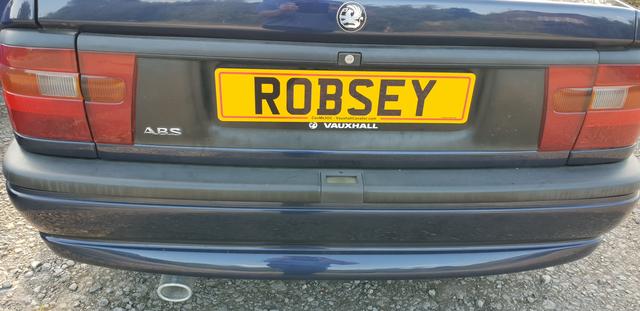
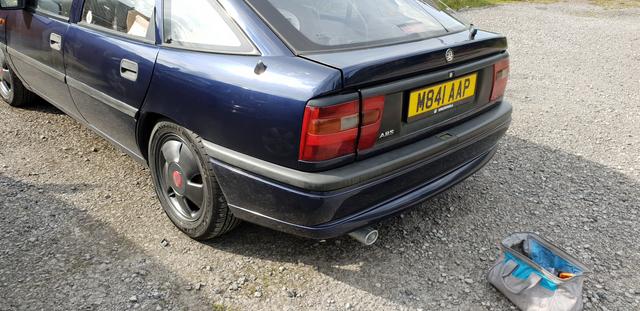
I replaced my good standard LSi muffler with a "GT" (UK SRi) muffler, and there is a deeper sound from the back of the car when driving along the motorway.
Very nice sound and not too loud.


